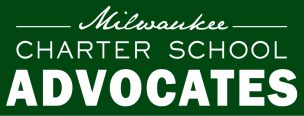
Milwaukee Collegiate Academy has done just that. They reflect a growing trend among charter schools to defy the odds and do what others say can’t be done.
Sam Mewes, College Coach and Counselor at MCA, shared the school’s philosophy and practice in a recent interview. What is revealed is a deep sense of mission and commitment with persistent and consistent support. The school is transparent with students and families and provides a very structured pathway for students to enroll in college. College prep isn’t something “extra” that the school provides–it is ingrained in how they operate.
The schools starts with a mission of “to and through” college that is present in written and verbal communication and in the design of the educational and out-of-school program support. The overall approach could be categorized with four main efforts:
Partnerships
The school has three partnerships that help provide college programming, on top of what the school provides. Each partner has a clear and specific role as follows:
· Great Lakes Higher Education provides a college access advisor that comes to the MCA campus and does classroom visits in grades 9 – 12, with technical information and advice about completing the steps to college.
· College Possible provides a coach that works specifically with 20 juniors to focus on specific tasks necessary for a transition to college.
· Carroll University offers “Project Pioneer” three times during the school year which is comprised of a 4- or 6-week academy offered on Saturdays to students. Students can also participate in a 1-week program in the summer where they live on campus and participate in pre-college activities.
If space is not available in these programs, the staff connects MCA students to other precollege programs offered in the area, such as the Boys & Girls Club’s Stein Scholars program.
Early Intervention
· The college conversation starts with a summer bridge program for all incoming freshman that culminates in a college tour.
· College tours are offered consistently over the years with local schools emphasized in freshman and sophomore years and out of state schools offered junior year.
· Students participate in a freshman seminar class, similar to freshman seminar classes offered at colleges, where students focus on reinforcement of writing skills, learn how credits work, learn the different parts of a transcript and more about the “how” of being a successful student.
Parents
· Parents are included, from day one, in realistic ongoing conversations about the level of work required to bring students up to grade level.
· Ongoing education of parents is crucial and MCA has five to six parents who serve as parent council members who help make phone calls and communicate the importance of attending meetings and other school events. These parents have also helped in the school’s efforts to raise funds for college tours/visits.
· The school conducts parent meetings at various times but the meetings in September of senior year have the highest participation rate of parents.
Programming & Culture
· The school operates with very high expectations and high levels of support to bring students up to grade level. This includes Honors courses offered at the freshman and sophomore years, with plans to expand in 2015/16 to 11th grade and 2016/17 to 12th grade so students experience rigorous coursework.
· Every classroom has a “college corner” maintained by the teacher with banners and signage about colleges, applications, scholarships, etc.
· The school maintains a dedicated college resource center, where students know is “the place” to complete college applications, scholarships and the requisite essays. It is most busy, especially with seniors, during lunch, advisory and after school. This is the central repository for all college-related information.
· Senior seminar is taught by an English teacher and is required of seniors every other day. The focus is on writing but also on college, and tackling tasks such as their personal statement and securing letters of recommendation. Students must apply to six colleges and must gain at least one acceptance.
· Alumni come back for “Alumni Day,” which is the last day before winter break. Dozens of college students share their advice with current MCA students. This is done on a rotating schedule during advisory until all students have participated.
· College acceptance “Shout Outs” are announced every Friday while students are hearing back from the colleges that accepted them.
· The college coordinator maintains detailed records on each student’s steps in the college application, scholarship and financial aid process; even though the partnering organizations do this to varying degrees, the school wants to maintain their own records on this.
· For students who do not attend college right after high school, the school maintains an “open-door” policy and will still help alumni apply and enroll in college if they want to.
The challenges in maintaining such a concerted effort are many, and MCA has realized the significant financial challenges that students face once they are enrolled in college. MCA is figuring out how to create more “touch points” with students once they are in college to increase the likelihood that they will persist and earn their degree. This part of their “to and through” commitment is still developing and we look forward to learning more about the MCA model as more students matriculate to college.

 RSS Feed
RSS Feed